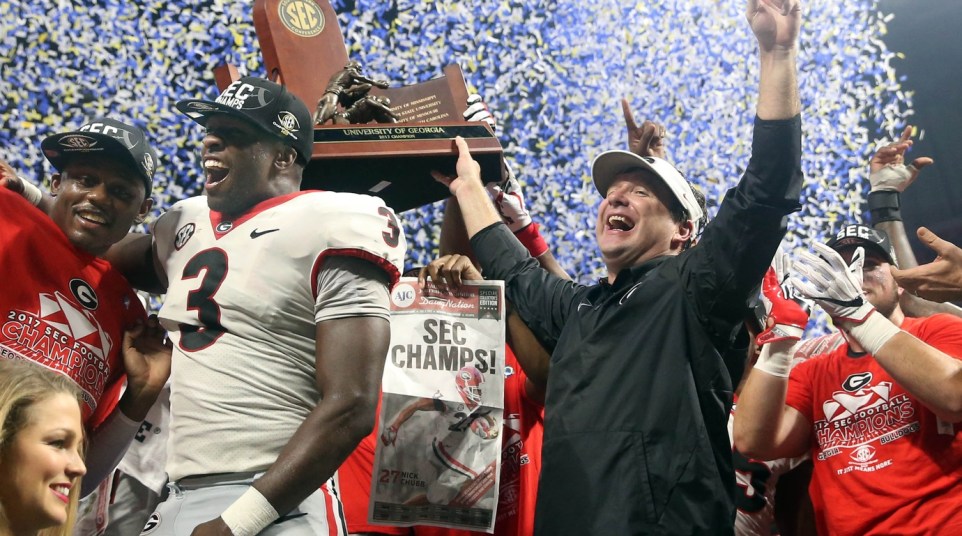
Kirby Smart's raise is going to be huge: How huge should it be?
When Kirby Smart’s agent sits down with the Georgia brass to talk numbers, he won’t have to borrow the famous line from Rod Tidwell.
After winning an SEC Championship and leading Georgia to its first Playoff berth, nobody will need to yell: “Show me the money!” Smart’s Year 2 speaks for itself. In one year, Smart did the impossible. He made Georgia fans think that they had the 41-year-old version of Nick Saban running their program.
That, however, will come at a price beyond 2017. The $3.75 million Smart was paid in 2017 was perhaps the best bargain in all of college football next to his Playoff counterpart, Lincoln Riley, who earned $3.1 million in his first season as a head coach. Under his current deal, Smart would make just more than Will Muschamp and Mark Stoops in 2018.
Of course, all three of those coaches are represented by agent Jimmy Sexton, who now represents 11 of the 14 SEC head coaches. With the market on SEC coaches skyrocketing to insane new heights, it’s only a matter of time before Smart joins the party. The “when” is not that important.
The “how much” is the more pressing matter.

Credit: Marvin Gentry-USA TODAY Sports
For casual fans, it might not seem so inevitable that Smart would get a significant raise after his second season on the job. At this time last year, Smart was a 7-5 coach getting ready to play in the Liberty Bowl.
In Athens, that’s not a “show me the money” season. That’s a “show me the door” season.
All of that, obviously, is a thing of the past. The present is all that matters for Smart, who essentially had everything work in his favor to land a new deal. Besides his personal accomplishments — he’s in line to collect the majority of a possible $1.8 million in bonuses in 2017 — the market was extremely kind to Smart.
In the past 2 weeks, look at all the things that happened in the SEC coaching landscape:
- Gus Malzahn to make $7 million annually after signing extension
- Jimbo Fisher gets $75 million over 10 years at Texas A&M
- Dan Mullen signs deal with Florida that will pay him $6 million annually
Shoot, even Jeremy Pruitt is set to make $3.8 million in his first season as a head coach at Tennessee. Every time one of those things happened, Smart probably let out a little fist pump. I would’ve.
His price went up in a major way thanks to those four Sexton clients. So how much did Smart’s stock rise?
Well, it’d be shocking if Smart coached for anything less than $5 million in 2018. That should be considered the bare minimum, but even that might not be high enough. Smart’s lack of head coaching experience was the reason he made $3.75 million per year to start. All of that went out the window when Smart hoisted that SEC Championship trophy.
For that reason, Malzahn’s deal might have the biggest impact on Smart’s. Malzahn was in a different spot with Arkansas putting the full-court press on, but the result still said a lot about the going rate for the coach of a top-10 SEC team.

Credit: Dale Zanine-USA TODAY Sports
Do I expect Smart to almost double his salary and make $7 million per year? I wouldn’t be shocked. After all, he beat Malzahn when it mattered most. If he gets Georgia its first national championship since 1980, Smart will be worth well more than $7 million to the university.
A national championship is the ultimate trump card when it comes to salary negotiations, win or lose. Dabo Swinney earned consecutive raises for his consecutive national championship berths. His bump up to $6.75 million annually was agreed upon before the start of the 2017 season. If Smart pulls off that kind of a feat this year, it’s not crazy to think he could earn at least $6.75 million beginning in 2018.
A lot of these negotiations could be determined by what Smart does the rest of the postseason. And yes, there will be negotiations win or lose. Anyone expecting Smart or Sexton to take an alma mater discount is naive to the current coaching market. If Georgia refuses to meet Sexton’s likely high demands, it’d be a stunning turn of events.
In all likelihood, Smart will ink a deal that pays him somewhere between $5.5-$7 million annually, depending on how things play out the next month. We could also be looking at a scenario in which Smart’s raise is closer to the $5.5 million with plenty of incentives laced into the deal in case there was any concern of this being a 1-year wonder.
But given how dominant Georgia was to reach the Playoff, there’s nothing to suggest that the Dawgs will fade after 2017. The promising underclassmen and the recruiting suggest that Georgia isn’t going anywhere. If the program really does believe it has the 41-year-old Saban, it will do whatever it can to lock him up for the long haul.
Right now, though, it seems inevitable. Smart is about to get shown a whole ‘lotta money.
